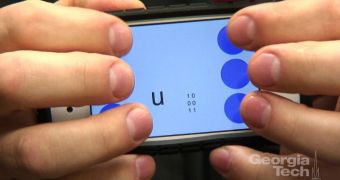Developed by researchers from Georgia Tech, the BrailleTouch application will allow visually impaired users to type messages easier and more accurate.
Although the application presented is just a prototype for mobile devices that feature a touchscreen display, it can become a complete solution for texting without looking at a mobile's screen.
“Research has shown that chorded, or gesture-based, texting is a viable solution for eyes-free written communication in the future, making obsolete the need for users to look at their devices while inputting text on them,” said Mario Romero, Postdoctoral Fellow in the School of Interactive Computing (IC) and the project’s principal investigator.
According to developers, the application is open-source, which means that devs can add other new useful features and improvements.
BrailleTouch is based on Braille writing system, which is used by the visually impaired and it has been developed as a texting tool for this particular type of smartphone users.
Basically, the application uses a gesture-based solution, which allows users to turn a smarpthone's touchscreen into a soft-touch keyboard, which is based on Braille and requires only six keys.
The most important trait of the BrailleTouch technology is the use of the six-key configuration, in order for the keyboard to fit on the touchscreen display.
This design allows users to keep their fingers in a fixed position while texting and type with a majority of their fingers, just like typing Braille using a standard keyboard.
The researchers behind the application has already finished working on iPhone and iPad versions of BrailleTouch, and are currently developing an Android version.
“We are currently designing a study to formally evaluate BrailleTouch through both quantitative and qualitative methods. We will measure the typing speed and accuracy of visually impaired users and capture the feedback from study participants in areas such as comfort, ease of use and perceived value,”said Caleb Southern, an IC graduate student.

 14 DAY TRIAL //
14 DAY TRIAL // 